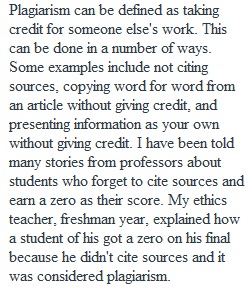


Q Ethics: Plagiarism Purpose: To identify examples of ethical/unethical behavior in public speaking. Grading Rubric 10 Points Possible Points 6 points 4 points 2 points Initial response Addresses all parts of the question clearly, thoughtfully, and thoroughly. All parts of the question are answered, but detail is lacking, or detail is present, but not all parts of the question are answered. Minimal response. Points 4 points 2 point 0 points Peer Responses At least 2 responses meet specifications and encourage interaction and/or discussion. Less than 2 responses meet specifications. No responses meet specifications. In your initial response (Due Thursday): ? Search for, and post here, a definition of plagiarism. (Remember to cite the source of the definition!) ? Provide examples of plagiarism that you have observed (or committed, if you want to go there!). ? Answer one or more of the following questions: o Why is plagiarism wrong? o What should the penalty be for plagiarism? o What kinds of things constitute plagiarism? In your responses to your peers’ initial postings, (Due Sunday night): ? Engage in discussion about the comments your classmates have made. ? Offer suggestions about how you can avoid committing plagiarism.
View Related Questions